 Petzlover
Petzlover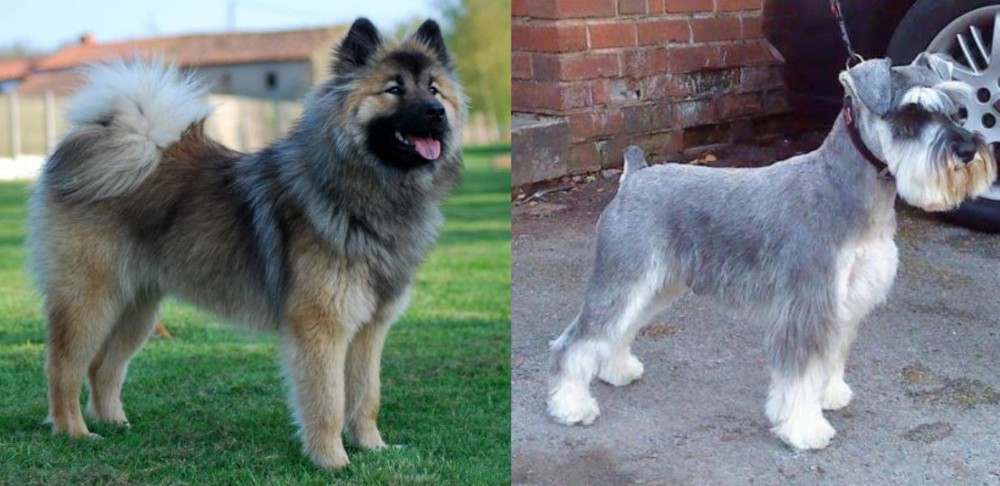 Both Eurasier and Miniature Schnauzer are originated from Germany. Eurasier may grow 24 cm / 10 inches higher than Miniature Schnauzer. Eurasier may weigh 22 kg / 49 pounds more than Miniature Schnauzer. Both Eurasier and Miniature Schnauzer has almost same life span. Both Eurasier and Miniature Schnauzer has same litter size. Both Eurasier and Miniature Schnauzer requires Moderate Maintenance.
Both Eurasier and Miniature Schnauzer are originated from Germany. Eurasier may grow 24 cm / 10 inches higher than Miniature Schnauzer. Eurasier may weigh 22 kg / 49 pounds more than Miniature Schnauzer. Both Eurasier and Miniature Schnauzer has almost same life span. Both Eurasier and Miniature Schnauzer has same litter size. Both Eurasier and Miniature Schnauzer requires Moderate Maintenance.
 The Eurasier is a dog which hails from Germany and is a cross between the Wolf Spitz, the Chow Chow and the Samoyed.
The Eurasier is a dog which hails from Germany and is a cross between the Wolf Spitz, the Chow Chow and the Samoyed.
The puppies of the dog could reproduce themselves, so that a new breed was recognized by the German Kennel Club as well as the Federation Cynologique Internationale.
It is believed that the name was chosen as a referral to the dog’s European and Asian background. Today the Eurasier is found in most European Union countries as well as in Canada and the United States, but still the breed’s population is low, with efforts in place to raise its numbers.
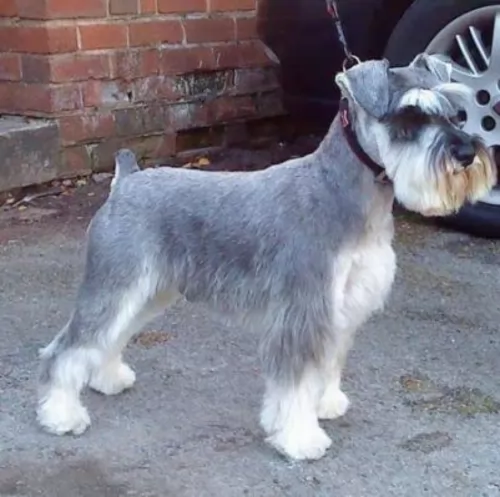 Miniature Schnauzers were first bred in Germany in the 19th century being bred from Affenpinschers and Standard Schnauzers.
Miniature Schnauzers were first bred in Germany in the 19th century being bred from Affenpinschers and Standard Schnauzers.
This dog was always used to control rats on farms, but these days he is more a companion. It is believed that the start of the modern Miniature Schnauzer in the United States was around 1924 when dogs were imported from Germany.
It was in 1933 that the Miniature Schnauzer was recognized by the AKC as a separate breed from the Standard Schnauzer.
 The Eurasier is a medium-sized dog, standing at roughly 48cm to 60cm in height and weighing 18kg to 32kg. He has a medium to long length coat in a range of different colors – fawn, black and tan as well as a mix of colors such as silver and black.
The Eurasier is a medium-sized dog, standing at roughly 48cm to 60cm in height and weighing 18kg to 32kg. He has a medium to long length coat in a range of different colors – fawn, black and tan as well as a mix of colors such as silver and black.
He has medium-sized, erect ears and the tail is always held over the back. The nose is black and the eyes are also medium in size and dark and should never be obscured by the dog’s hair.
Confident while being reserved around strangers, the calm Eurasier isn’t an aggressive dog.Bred as a companion animal, he is tolerant of other pets in the house as well as with children, and having him socialized and trained will ensure that he is obedient, relaxed and amicable. He is an intelligent dog and responds well to training.
He loves to be with his human family and will adapt happily to city- or country life. He doesn’t have high activity levels so daily walks and ball games will be sufficient for him.
He isn’t the kind of dog that you can keep in your backyard as a watchdog and then just neglect him. He’ll become bored and destructive through no fault of his own.
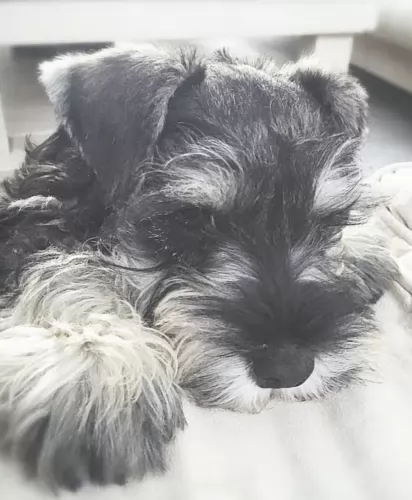 The Miniature Schnauzer is a small dog breed that stands between 30 to 36cm in height and weighs between 5 and 10kg.
The Miniature Schnauzer is a small dog breed that stands between 30 to 36cm in height and weighs between 5 and 10kg.
He has a sturdy body with a dense, wiry coat which most people prefer to have stripped. Because stripping is quite tedious, many of these dog owners prefer to have the coat clipped which actually gives the coat a greyish look to it.
The coat is usually a mix of black and silver. Some people refer to the Miniature Schnauzer as having a salt-and-pepper coat – hairs that are a mix of black and white. The dog has a double coat with the outer coat being wiry and the undercoat being a lot softer.
This is a dog that will need to be groomed frequently to prevent matting. A noticeable feature with these dogs is the rectangular shaped head with alert slanted eyes and bushy eyebrows, mustache and beard. In fact the word ‘Schnauzer’ means beard or muzzle.
The ears have been traditionally cropped but these days they are left and then they tend to be half-erect, half-floppy.
This is a tough little dog, fearless, cheeky, arrogant, alert and also friendly. A draw-card with him is that he is considered as a low-shedder and being hypoallergenic.
They’re very intelligent dogs too and will learn quickly when you give him training and socialization. This is important for a dog like this as he can quickly show you that he is strong willed and independent. Training and socialization makes him much nicer as he becomes more balanced and obedient.
He is full of life and extroverted and you can count on him to join you wherever you are and whatever you’re doing. Whether watching TV, swimming or hiking, he’ll be there and turn every occasion into a festive event. He is a loving, loyal dog, making a splendid pet.
He's protective of his human family and tends to be suspicious of strangers, and this is what makes him such a great watchdog.
 You can just see on the face of the Eurasier that he is a loving, gentle dog who wants to be part of a loving human family.
You can just see on the face of the Eurasier that he is a loving, gentle dog who wants to be part of a loving human family.
As a companion dog he makes a splendidly devoted and loyal pet, wanting to be involved in everything his human ‘pack members’ are doing. He is healthy, intelligent, playful and loving and when you invest in such a pet, you’re investing in a close, loving relationship for many years.
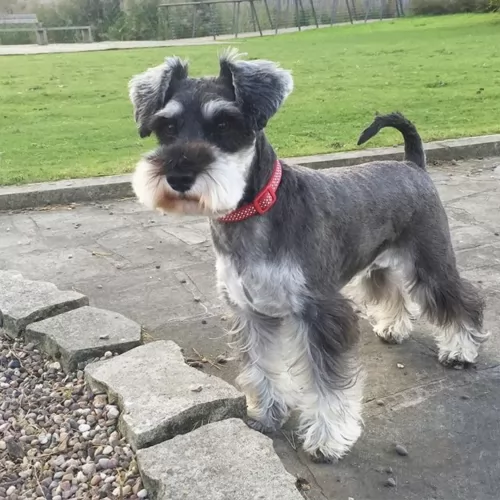 Miniature Schnauzers are such adaptable little dogs, quite happy to make a home with you in the city or in the countryside.
Miniature Schnauzers are such adaptable little dogs, quite happy to make a home with you in the city or in the countryside.
They’re sociable dogs, so just being with his human family wherever they are will suit him well. If he lives in the city however, he will need to have a walk everyday or taken to the park for a run.
He is also a dog that scarcely sheds, so he suits people battling with allergies. With an average life expectancy of 12 to 14 years, if you nurture your Mini Schnauzer and give him the best food and exercise there is, as well as loving him, you’re going to have a loyal and devoted pet.
 To a large extent, we have the health of our pets in our hands. The way we treat them – the food we give, the activities he takes part in, his sleeping facilities and the attention we give him all contribute to whether he will be healthy or not.
To a large extent, we have the health of our pets in our hands. The way we treat them – the food we give, the activities he takes part in, his sleeping facilities and the attention we give him all contribute to whether he will be healthy or not.
Nonetheless there are dogs who enjoy the best life and yet they still get sick. The Eurasier is a healthy dog breed who can push 12, 13 or 14 years, but still there are some common dog diseases to look out for.
Problems which are of concern are hip- and elbow dysplasia and patellar Luxation. Patellar luxation is when the dog's kneecap becomes dislocated and you see your pet holding up his hind leg for a while. These dislocated kneecaps are quite common in dogs and can lead to arthritis and even lameness.
Your vet can diagnose this problem through different means to help your pet.
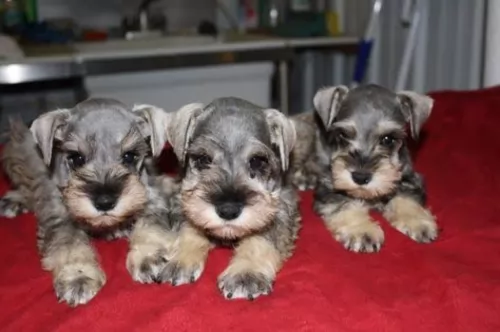 Your Miniature Schnauzer is pretty healthy and he isn’t likely to cost you much in terms of vet fees. There are however some common dog problems that you want to be aware of such as cataracts of the eye and hypothyroidism.
Your Miniature Schnauzer is pretty healthy and he isn’t likely to cost you much in terms of vet fees. There are however some common dog problems that you want to be aware of such as cataracts of the eye and hypothyroidism.
This a a problem in the lens of the eye. The lens should be clear, and when a dog has a cataract, it obscures the vision. The size of the cataract can lead to blindness.
Diabetes in a dog can bring on cataracts as can genetics or damage to the eye from exposure to ultraviolet light. Fortunately, dogs with cataracts can still see. Dogs with old cataracts can have surgery to remove them.
When a dog owner suspects a cataract in their pet’s eye it is best to treat it immediately with anti-inflammatory dog cataract eye drops. Cataracts never go away however without surgery.
The thyroid gland in the neck produces a hormone called thyroxine. It controls metabolism, but with hypothyroidism, enough of the hormone isn’t made. Its a common disease which affects all dog breeds.
Signs of hypothyroidism include hair loss, weight gain, intolerance to cold and a troublesome skin. To have the disease diagnosed, the vet will do a series of blood tests.
 The Eurasier, just like any other dog, requires high quality food. Luckily, as far as convenience goes, there are some excellent commercially manufactured foods, but you still need to check out the ingredients on the packaging as you want to avoid some of the dog foods high in chemicals and fillers.
The Eurasier, just like any other dog, requires high quality food. Luckily, as far as convenience goes, there are some excellent commercially manufactured foods, but you still need to check out the ingredients on the packaging as you want to avoid some of the dog foods high in chemicals and fillers.
The best pet foods are the ones that are high in protein, and meat sources such as chicken, beef or salmon for instance should show up among the top 5 ingredients.
Your Eurasier won’t want to eat kibble every day of his life so add in your own homemade cooked brown rice, vegetables and chicken from time to time. Also, every now and again, it will be of tremendous value to your pet’s immune system to include some raw meat.
Brush your Eurasier twice a week to keep his coat shiny and healthy. Grooming your pet has a number of benefits apart from making him look good. It infuses him with a healthy glow – he literally glows with a sense of wellbeing and confidence because you care for him.
The benefits of brushing your pet include better blood circulation and a shinier, healthier coat. Also check your dog’s nails, check his ears inside and out and make sure to attend to his teeth 2 or 3x a week. There are special toothbrush and toothpaste designed specifically for dogs.
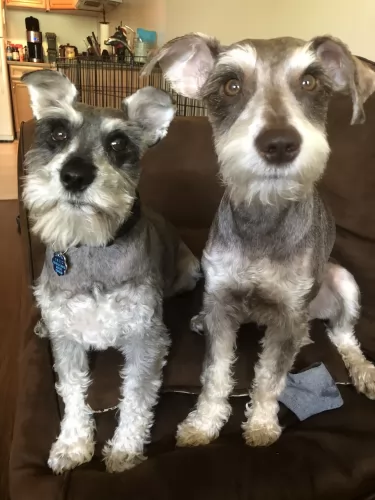 Let’s look at several ways you need to care for your Miniature Schnauzer -
Let’s look at several ways you need to care for your Miniature Schnauzer -
Make sure you have his puppy injections on time. This means knowing which veterinarian you’ll use. Later on if you don’t want to go in for breeding, you will need to have your pet spayed or neutered.
Make sure you have a nice warm, dry spot for your dog to sleep. It can be a cardboard box, or you can buy a dog basket or sleeping platform. Make sure your pet loves it and knows he can retreat to it anytime he wants.
If he goes outside for a few hours, make sure that he has a place to lie in the shade and away from the elements.
Good food promotes good health and longevity. You can feed your pet one of the top quality commercially manufactured foods and give your pet some variety by adding in some boiled chicken, vegetables and brown rice. Some raw meat occasionally can also be excellent for your pet.